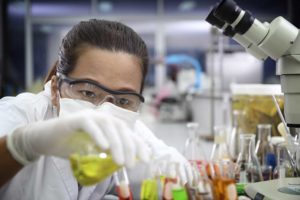Disclaimer: The information on our website is provided for general information purposes only. We make no representations or warranties of any kind, express or implied, about the completeness, accuracy, reliability, suitability or availability with respect to the website or the information contained on our website for any purpose. Any reliance on such information is therefore strictly at your own risk and we are not liable for any damages or losses arising out of or resulting from your reliance on any information contained on our website.
A chemist tests ways to make existing products better and develops new products. For example, household cleaners, pharmaceutical drugs, plastics, and several other products may be improved by a chemist. Chemists analyze and test substances to find out their composition and concentration of elements. They may also write technical reports that would detail methods and results of their research. Watch a video to learn what a chemist does:
How to Become a Chemist
A bachelor’s degree in chemistry or a related field is required to become a chemist or materials scientist. Some employers may prefer experience and a master’s degree in a similar field. Other positions may require a Ph.D., especially for research positions. According to O*NET OnLine, most chemists surveyed held a bachelor’s degree. In college, you will take high level chemistry courses and other courses in science, technology, and math. If you are in high school, consider taking higher level math and science courses to prepare you for your college coursework.
Job Description of a Chemist

A chemist works in applied research, as well as basic research. In the applied research, a chemist helps lead to a development and discovery of improved or new plastics, drugs, or cleaners (to name a few). Chemists also determining the structure, properties and composition of matter. They conduct experiments and tests with the ways that combinations of elements might react to each other.
A chemist directs technicians to analyze components and a material’s physical properties. They also oversee the techniques and proper chemical processing of technicians and scientists. In addition to test operating temperatures, they also test ingredients, and the impact of mixing times. These professionals are required to prepare solutions, reagents, and compounds in the procedures of the labs. Not only do they ensure quality they must ensure safety requirements are met. They would be required to write technical reports of their research findings and present them to engineers, scientists and others.
A chemist needs to computer savvy and knowledge of sophisticated laboratory instruments that are used for experimental analysis, modeling, or simulation. They would need to be able to use three-dimensional computer modeling software for their research and studies. He or she would most likely work on a team with other scientists, engineers, physicists, biologists and others in their research. Many chemists work in the field of geochemistry, biochemistry, or with their experience in chemistry may choose to go on to become a teacher or professor.
Lauren Curtis works as an analytical chemist for the Center for Veterinary Medicine. The following video highlights her career as a chemist.
Career Video Transcript
Chemicals make up our world. Some are natural, others are synthetic made by people. But every chemical is unique, and behaves differently under changing conditions, such as when heated, exposed to light, or combined with other substances. Chemists study how chemicals affect each other, and how they interact with the environment. They conduct experiments in laboratories, and analyze results and data. Most chemists use databases, scientific software, graphics, and design and photo imaging tools in their work.
Chemists work with many different materials in different fields, from energy development to medicine and food processing. They have invented and improved products like medicines, fibers, paints, adhesives, cosmetics, and electronic components, to name just a few. Chemical manufacturing plants employ many chemists in production and quality control, where safety is critical. Interdisciplinary fields, like biochemistry and geochemistry, are also growing. Besides manufacturing, chemists work in colleges and universities, government, and independent testing and research laboratories.
A bachelor’s degree in chemistry or a related science is required to enter the field. Many working chemists have a master’s degree or a PhD in chemistry. They usually specialize in a particular field. For any chemistry position, curiosity, the ability to focus on details, and painstaking follow-through are essential “elements” of success.
Article Citations
- Bureau of Labor Statistics, U.S. Department of Labor, Occupational Outlook Handbook, Chemists and Materials Scientists.
- National Center for O*NET Development. 19-2031.00. O*NET OnLine.

